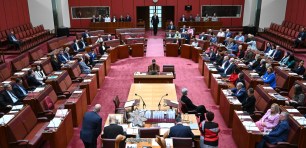
Source: Pexels/Alex Green.
The start of each financial year usually brings with it a host of tax changes that SMEs need to be aware of, as well as a range of other legal changes that affect large sections of the Australian business community.
From an increase in the national minimum wage and superannuation guarantee to changes to parental leave entitlements and migration rules, there’s plenty for business owners to get their heads around as the 2023-24 financial year begins.
Here’s a quick guide to the key changes your business needs to be aware of.
Minimum wage increase
Australia’s minimum wage will increase to $882.80, or $23.23 per hour, from July 1.
The new National Minimum Wage will apply to employees who aren’t covered by an award or registered agreement, starting from the first full pay period on or after July 1. If your business’ weekly pay period starts on a Monday, this means the new rates will apply from Monday, July 3, 2023.
Modern award minimum wages will also rise by 5.75%, with the overall changes estimated to affect the wages of around a quarter of Australian employees.
More information about the changes is available here.
Superannuation guarantee rate
The amount of superannuation employers need to pay their employees will also change on July 1, due to a scheduled increase in the superannuation guarantee (SG) rate.
The SG rate will increase from 10.5% to 11% on July 1, 2023, and is legislated to increase further to 12% by 2025.
Employers will need to use the new rate to calculate super payments on or after July 1, even if some or all of the pay period covers work that was done before July 1.
More information about the superannuation obligations of employers is available here.
Changes to asset depreciation rules
The Temporary Full Expensing regime will end on July 1, with immediate deductions on business expenses reverting to the Instant Asset Write-Off model.
Under the new Instant Asset Write-Off limits, businesses with an annual turnover of less than $10 million will be free to claim an immediate tax deduction on assets up to $20,000 in value.
The scheme will operate on a per-asset basis, meaning businesses can write off multiple assets at once.
Assets costing $20,000 or more can still be placed in the small business simplified depreciation scheme, providing deductions of 15% in the first year, and 30% each year after.
You can read more about changing depreciation rules here.
Energy bill relief
The federal government has promised energy bill relief to eligible small businesses from July 1.
Co-contributions from some states and territories mean some small businesses will receive energy bill relief of up to $650.
That relief will be automatically applied to power bills, however, power usage thresholds vary between states and territories.
More information on the energy relief package is available here.
Migration changes
Employers looking to sponsor a temporary skilled migrant must pay them more than the Temporary Skilled Migrant Income Threshold (TSMIT).
That limit is designed to prevent migrant worker exploitation and keep employers from undercutting the wages offered to Australian workers.
The TSMIT has been $53,900 since 2013, but it will lift to $70,000 on July 1 this year.
More information on the TSMIT change, and the federal government’s other immigration plans, can be found here.
Cap on international worker hours
To ensure businesses could find staff in a COVID-depleted economy, the 40-hour-a-week cap for student visa holders was relaxed early in the pandemic and suspended entirely in January 2022.
It returns on July 1 with a new limit of 48 hours of work per fortnight.
Businesses that employ student visa holders should consider how the new cap affects their hiring plans.
You can read more about the change here.
Unfair dismissal high-income threshold
There are certain limits to which employees can file for an unfair dismissal claim.
The Fair Work Commission states that workers not covered by a modern award or a relevant enterprise agreement must earn below a certain income threshold for unfair dismissal claim eligibility.
Currently that threshold is $162,000 per annum. It will rise on July 1, 2023, to $167,500.
The compensation limit for those claims will also rise to $83,750, equal to half of the high-income threshold, for dismissals occurring on July 1 or afterwards.
Fair Work Commission fees
Paperwork fees at the Fair Work Commission will also rise through indexation on July 1.
From that date, the application fee will increase to $83.30.
The Fair Work Commission says that covers applications related to dismissal, general protections, and bullying and sexual harassment at work.
“There is no fee to make an application to deal with a sexual harassment dispute under section 527F of the Fair Work Act,” the Fair Work Commission explains.
You can read more about that change here.
Parental leave
From July 1, the current entitlement to 18 weeks of paid parental leave will combine with the current Dad and Partner Pay entitlement of two weeks’ pay.
The new 20-week paid parental leave entitlement can be shared between partnered parents, while single parents will be entitled to the full 20 weeks themselves.
The change will affect parents whose child is born or is placed in their care, on or after July 1, 2023.
The 20 weeks can be claimed in separate blocks too, which means parents can take multiple parental leave breaks before their child turns two years old.
You can read more about the policy here.
Sharing Economy Reporting Regime
Starting on July 1, the Australian Taxation Office (ATO) will begin collecting data from accommodation booking platforms and rideshare apps as part of the new Sharing Economy Reporting Regime.
The ATO will then match data from those gig and shared economy platforms against individual tax returns, to ensure people who earn income through holiday leases or rideshare work pay the correct income tax.
The rules will eventually cover more electronic distribution platforms: websites, apps, or marketplaces that allow sellers to make their supplies available to customers, and facilitate purchases directly through the platform itself.
That includes accommodation booking platforms or rideshare apps.
“Reporting begins for all other reportable transactions made from July 1, 2024,” the ATO says.
More information about the system is available here.
Penalty unit increase
Penalty units are the ‘building blocks’ of fines levelled in both criminal and civil proceedings under federal law.
Currently, one penalty unit is equal to $275.
According to the formula inserted in the Crimes Act 1914, it will be indexed up on July 1 this year, to $313.
You can read more about penalty units here.
Business name and company name registration fees
A number of company fees and business name fees will rise on July 1, in keeping with indexation.
The cost of registering a company will rise 7% from $538 to $576, according to the Australian Securities and Investment Commission (ASIC).
The cost of reserving a company name will jump from $55 to $59.
Simultaneously, business name registration or renewal for one year will rise from $39 to $42.
More information is available here.
Small claims procedure
From July 1, the cap on unpaid entitlements an employee can seek through the small claims process will lift from $20,000 to $100,000.
The change comes as part of the federal government’s ‘Secure Jobs, Better Pay’ legislative package.
Discussing the measure before it passed into law, Minister for Employment and Workplace Relations Tony Burke said the $20,000 cap was too restrictive.
“The current low threshold forces many workers to pursue pay claims through a full court process which can be expensive, time-consuming and complex,” he said.
You can read more here.
Child employment laws in Victoria
The way Victorian businesses are allowed to hire children under the age of 15 will change from July 1, 2023.
Currently, businesses must apply for a permit for each child they hope to hire. That will change to a licencing system from next month, allowing businesses to hire multiple children under one licence.
The state government says the new system will streamline the process for business while maintaining protections for very young workers.
You can read more about the changes here.
WorkCover premiums in Victoria
Businesses in Victoria can also expect a significant lift to their WorkCover premiums from July 1, 2023.
The premium, designed to fund the WorkCover insurance system, will rise from 1.272% of payroll to 1.8% in 2023-24, marking a 41% increase.
The hike arrives as the WorkCover scheme chases financial stability.
Last financial year, WorkCover recorded a deficit of $1.6 billion as claim payouts outstripped premiums paid by businesses.
You can read more about the change here.
ACT plastics ban
Businesses in the ACT will face a new single-use plastic ban from July 1.
Items prohibited from sale will include single-use plastic plates and bowls, expanded polystyrene loose-fill packaging and trays like takeaway containers, and products containing plastic microbeads, like certain cosmetics and cleaning products.
You can read more about the ban here.
WA regional allowance increase
Employers with staff in certain regional WA locations must pay an extra weekly allowance under the state’s industrial relations system.
Those rates will be adjusted on July 1.
The new allowance rates will stretch from $9.00 per week for employees in Kalbarri up to $66.60 in Argyle.
You can read more about the changes here.
Handpicked for you

Bonus deductions, super, and trusts: 20 EOFY tax tips for small business



COMMENTS
SmartCompany is committed to hosting lively discussions. Help us keep the conversation useful, interesting and welcoming. We aim to publish comments quickly in the interest of promoting robust conversation, but we’re a small team and we deploy filters to protect against legal risk. Occasionally your comment may be held up while it is being reviewed, but we’re working as fast as we can to keep the conversation rolling.
The SmartCompany comment section is members-only content. Please subscribe to leave a comment.
The SmartCompany comment section is members-only content. Please login to leave a comment.